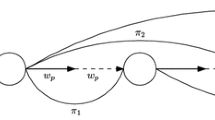Abstract
We present a randomized algorithm for asynchronous wait-free consensus using multi-writer multi-reader shared registers. This algorithm is based on earlier work by Chor, Israeli and Li (CIL) and is correct under the assumption that processes can perform a random choice and a write operation in one atomic step. The expected total work for our algorithm is shown to be O(N log(logN)), compared with O(N 2) for the CIL algorithm, and O(N logN) for the best known weak adversary algorithm. We also model check instances of our algorithm using the probabilistic model checking tool PRISM.
Preview
Unable to display preview. Download preview PDF.
Similar content being viewed by others
References
Aguilera, M.K., Chen, W., Toueg, S.: Failure detection and consensus in the crach recovery model. Distributed Computing 13(2), 99–125 (2000)
Aspnes, J., Herlihy, M.: Fast randomized consensus using shared memory. Journal of Algorithms 11(3), 441–461 (1990)
Aumann, Y., Kapah-Levy, A.: Cooperative sharing and asynchronous consensus using single-read single-writer registers. In: Proceedings of the 10th ACM-SIAM Anuual Symposium on Discrete Algorithms (SODA), pp. 61–70 (1999)
Aspnes, J.: Lower bounds for distributed coin-flipping and randomized consensus. Journal of the ACM 45(3), 415–450 (1998)
Aspnes, J.: Randomized protocols for asynchronous consensus. Distributed Computing 16(2-3), 165–175 (2003)
Aumann, Y.: Efficient asynchronous consensus with the weak adversary scheduler. In: Proceedings of the Sixteenth Annual ACM Symposium on Principles of Distributed Computing, pp. 209–218 (1997)
Aspnes, J., Waarts, O.: Randomized consensus in expected O(n log2 n) operations per process. SIAM Journal on Computing 25(5), 1024–1044 (1996)
Baier, C., Kwiatkowska, M.: Model checking for a probabilistic branching time logic with fairness. Distributed Computing 11(3), 125–155 (1998)
Ben-Or, M.: Another advantage of free choice: completely asynchronous agreement protocols. In: Proceedings of the Second Annual ACM Symposium on Principles of Distributed Computing, pp. 27–30 (1983)
Buhrman, H., Panconesi, A., Silvestri, R., Vitányi, P.M.B.: On the importance of having an identity or is consensus really universal? In: Herlihy, M.P. (ed.) DISC 2000. LNCS, vol. 1914, pp. 134–148. Springer, Heidelberg (2000)
Bracha, G., Rachman, O.: Randomized consensus in expected O(n 2 logn) operations. In: Toueg, S., Kirousis, L.M., Spirakis, P.G. (eds.) WDAG 1991. LNCS, vol. 579, pp. 143–150. Springer, Heidelberg (1992)
Cheung, L., Hendriks, M.: Causal dependencies in parallel composition of stochastic processes. Technical Report ICIS-R05020, Institute for Computing and Information Sciences, University of Nijmegen (2005)
Chandra, T.D.: Polylog randomized wait-free consensus. In: Proceedings of the 15th Annual ACM Symposium on Principles of Distributed Computing, pp. 166–175 (1996)
Cheung, L.: Collection of PRISM models of the modified CIL algorithm (2005), available at http://www.niii.ru.nl/~lcheung/mcil/
Cheung, L.: Randomized wait-free consensus using an atomicity assumption. Technical Report ICIS-R05035, Institute for Computing and Information Sciences, University of Nijmegen (2005), available at http://www.niii.ru.nl/~lcheung/cilTR.pdf
Chor, B., Israeli, A., Li, M.: On processor coordination using asynchronous hardware. In: Proceedings PODC 1987, pp. 86–97 (1987)
Chor, B., Israeli, A., Li, M.: Wait-free consensus using asynchronous hardware. SIAM Journal on Computing 23(4), 701–712 (1994)
Dwork, C., Lynch, N., Stockmeyer, L.: Consensus in the presence of partial synchrony. Journal of the ACM 35(2), 288–323 (1988)
Fich, F., Herlihy, M., Shavit, N.: On the space complexity of randomized synchronization. Journal of the ACM 45(5), 843–862 (1998)
Fischer, M., Lynch, N.A., Paterson, M.S.: Impossibility of distributed consensus with one faulty process. Journal of the ACM 32(2), 374–382 (1985)
Israeli, A., Shaham, A.: Optimal multi-writer multi-reader atomic register. In: Proceedings of the 11th Annual ACM Symposium on Principles of Distributed Computing, pp. 71–82 (1992)
Kwiatkowska, M., Norman, G.: Verifying randomized Byzantine agreement. In: Peled, D.A., Vardi, M.Y. (eds.) FORTE 2002. LNCS, vol. 2529, pp. 194–209. Springer, Heidelberg (2002)
Kwiatkowska, M., Norman, G., Segala, R.: Automated verification of a randomized distributed consensus protocol using Cadence SMV and PRISM. In: Berry, G., Comon, H., Finkel, A. (eds.) CAV 2001. LNCS, vol. 2102, pp. 194–206. Springer, Heidelberg (2001)
PRISM web site, http://www.cs.bham.ac.uk/~dxp/prism
Author information
Authors and Affiliations
Editor information
Editors and Affiliations
Rights and permissions
Copyright information
© 2006 Springer-Verlag Berlin Heidelberg
About this paper
Cite this paper
Cheung, L. (2006). Randomized Wait-Free Consensus Using an Atomicity Assumption. In: Anderson, J.H., Prencipe, G., Wattenhofer, R. (eds) Principles of Distributed Systems. OPODIS 2005. Lecture Notes in Computer Science, vol 3974. Springer, Berlin, Heidelberg. https://doi.org/10.1007/11795490_6
Download citation
DOI: https://doi.org/10.1007/11795490_6
Publisher Name: Springer, Berlin, Heidelberg
Print ISBN: 978-3-540-36321-7
Online ISBN: 978-3-540-36322-4
eBook Packages: Computer ScienceComputer Science (R0)




